Deputy Director-General of Africa CDC Advocates Health Harm Reduction for Sustainable Development in Africa
Dr. Ogwell stressed the timeliness of the conference's theme, especially in the face of escalating challenges posed by climate change.
Marrakesh, Morocco - Dr. Ahmed E. Ogwell, the Deputy Director-General of the Africa Centre for Disease Control and Prevention (Africa CDC), has championed health harm reduction as a vital strategy for achieving the United Nations-backed sustainable development goals in Africa, writes Charles Mangwiro.
Dr. Ogwell made this statement during the 2nd African Conference on Health Risk Reduction held in the picturesque city of Marrakesh, Morocco.
The conference, held from September 27 to September 29, brought together administrative officials, experts, politicians, and professionals from Africa and beyond under the patronage of King Mohammed VI of Morocco.
Its objective was to deliberate on various aspects of public health policies and lay the groundwork for a healthier future by considering health from multifaceted perspectives encompassing the organic, psychological, economic, social, and environmental dimensions.
Dr. Ogwell stressed the timeliness of the conference's theme, especially in the face of escalating challenges posed by climate change.
He stated, "Reducing the risks of ill health is the best way for Africa to handle the multiple disease threats that our citizens face. Health harm reduction is therefore the most viable option considering the limited resources that we have in Africa."
Morocco's Minister of Health, Khaled Ait Taleb, actively participated in the conference and spoke about Morocco's ongoing efforts to mitigate health risks, including improving food quality and water treatment.
He emphasized the global nature of the challenges, saying, "Today, water is an issue for which we are looking for solutions. It is not just a Moroccan problem; it is a global problem."
Taleb also highlighted the importance of addressing environmental impacts, ensuring food security, and safeguarding water safety as fundamental elements in preserving human health and dignity.
He acknowledged the long road ahead in creating safe and equitable health environments in Africa.
The conference took place in the aftermath of a devastating earthquake in Morocco, emphasizing the need for proactive measures to address preventable environmental risks.
According to the World Health Organization (WHO), such risks account for a quarter of all global deaths and illnesses, totaling 13 million fatalities annually.
Africa's vulnerability to these risks is exacerbated by the continent's intricate climate system and socio-economic challenges. To address these challenges, the conference emphasized the importance of strengthening health determinants, promoting intersectoral actions, and improving data-driven communication.
In a video message, WHO Director-General Tedros Adhanon highlighted the imperative of continued prevention and preparedness for emergencies, policies to mitigate multiple disaster risks, and enhancing the resilience of populations against natural disasters for sustainable development.
He also stressed the role of climate change in intensifying food and nutritional insecurity, necessitating improvements in clean water systems to reduce hunger and enhance healthcare access for millions in Africa.
The conference symbolised a collective commitment to a healthier and more sustainable future for Africa, where health harm reduction is seen as a key strategy to navigate the complex challenges posed by climate change and other environmental factors.



